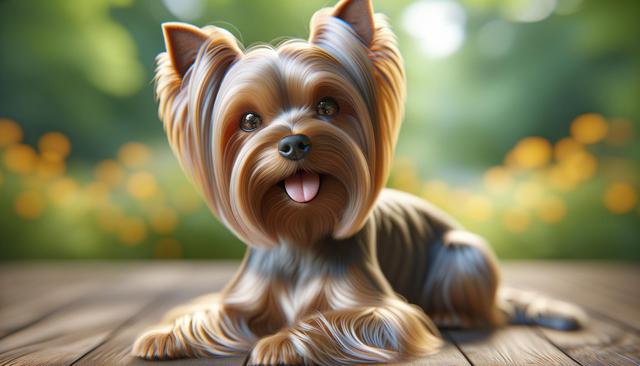Origin and History of the Yorkshire Terrier
The Yorkshire Terrier, affectionately known as the Yorkie, originated in 19th-century England. Bred initially for the practical purpose of catching rats in textile mills, this small dog quickly gained popularity for more than just its hunting skills. The breed was developed by workers who brought various small terriers from Scotland to the northern English counties, particularly Yorkshire, hence the name. These dogs were crossed with other terriers to refine their features and coat, resulting in the distinct breed recognized today.
Though its working-class roots are humble, the Yorkshire Terrier soon found its way into the laps of the British elite. By the late 1800s, it had become a fashionable companion dog. Its compact size and elegant coat made it a favorite among city dwellers, and it was eventually recognized by kennel clubs around the world. The breed’s popularity has continued to grow due to its adaptable nature and strong personality, making it a staple in many households.
Physical Characteristics and Coat Care
The Yorkshire Terrier is a toy-sized breed, usually weighing no more than 7 pounds (about 3.2 kilograms). Despite its small stature, it carries itself with a confident and alert demeanor. One of its most distinctive features is its silky, straight coat that often grows long and requires regular grooming to maintain its shine and prevent tangles. The coat is traditionally a mix of steel blue and tan, though variations can occur.
Proper grooming is essential for Yorkshire Terriers, especially those with full-length coats. Owners should be prepared for:
- Daily brushing to prevent knots and mats
- Regular bathing with dog-specific shampoo
- Trimming around the eyes and ears to avoid irritation
- Professional grooming every few weeks for maintenance
While some Yorkie owners choose to keep the coat short in a “puppy cut” for ease of care, the breed’s show-standard coat is a signature trait that many enthusiasts choose to maintain.
Personality Traits and Temperament
Yorkshire Terriers are known for their bold and spirited personalities. Though small in size, they often act as if they are much larger, displaying confidence and sometimes a bit of stubbornness. They are affectionate with their families and can be very loyal to one particular person. Yorkies thrive on human interaction and enjoy being the center of attention.
However, their assertive nature means they may not always get along with other pets, especially if not socialized early. Despite their size, they make effective watchdogs due to their keen sense of hearing and vocal tendencies. Key personality traits include:
- High intelligence and trainability
- Alert and responsive behavior
- Playful and energetic demeanor
- Occasional stubbornness, requiring consistent training
With proper training and socialization, Yorkshire Terriers can make well-behaved and loving companions for individuals or families.
Exercise Needs and Daily Activity
While Yorkshire Terriers are small, they are not content to be lap dogs all day. They require regular physical and mental stimulation to stay healthy and happy. Daily walks, playtime, and interactive toys help burn off their energy and prevent boredom-related behaviors such as excessive barking or mischief.
Owners should aim for at least 30 minutes of active engagement each day. Suitable activities include:
- Short walks around the neighborhood
- Games of fetch or tug-of-war
- Puzzle feeders or training exercises
- Supervised playtime with other small dogs
Though they enjoy activity, Yorkies are also adaptable to apartment living due to their size. As long as their exercise needs are met, they can comfortably live in small spaces and adjust well to indoor environments.
Health Considerations and Lifespan
Yorkshire Terriers are generally healthy dogs but, like all breeds, are prone to certain genetic conditions. Common health concerns include dental issues, patellar luxation, and tracheal collapse. Due to their small mouths, dental hygiene is particularly important, requiring regular brushing and professional cleanings.
With proper care, Yorkies can enjoy a long life, often reaching 12–15 years. To maintain their health, it’s important to:
- Schedule regular veterinary checkups
- Maintain a balanced diet with portion control
- Keep up with vaccinations and parasite prevention
- Prioritize dental care and grooming routines
Early health screenings and responsible breeding practices can reduce the risk of inherited conditions. Prospective owners should seek out reputable breeders or consider adopting through rescue organizations that prioritize the well-being of the dogs.
Conclusion: Is a Yorkshire Terrier Right for You?
The Yorkshire Terrier is a vibrant and loyal companion well-suited to individuals or families looking for a small dog with a strong personality. While they require consistent grooming and firm yet gentle training, their intelligence and affectionate nature make them rewarding pets. Whether you live in a small apartment or a larger home, a Yorkie can adapt beautifully as long as their social and physical needs are met. For those ready to invest time and care, the Yorkshire Terrier offers years of companionship and charm.




Leave a Reply